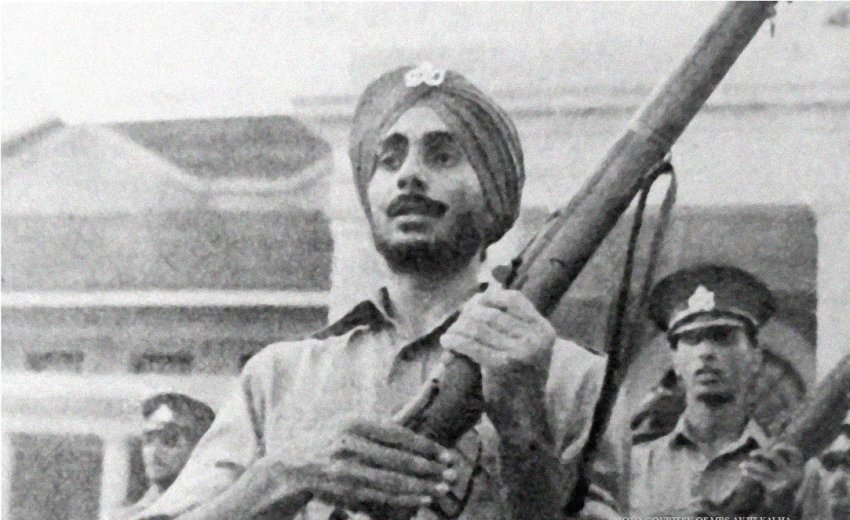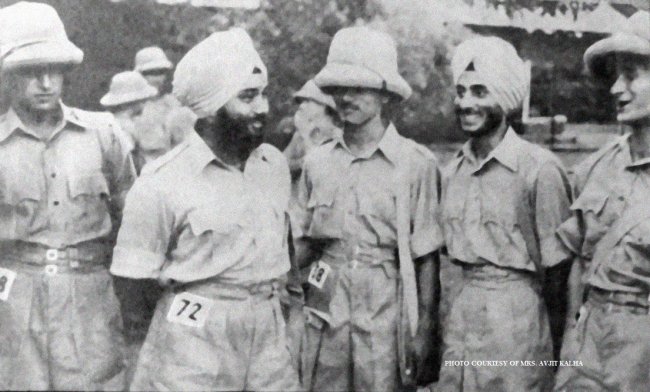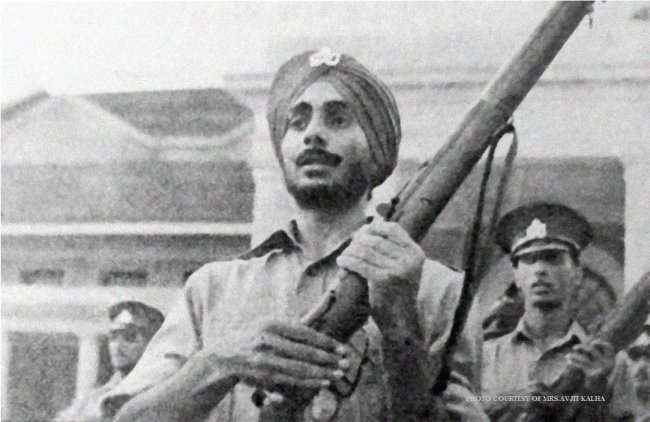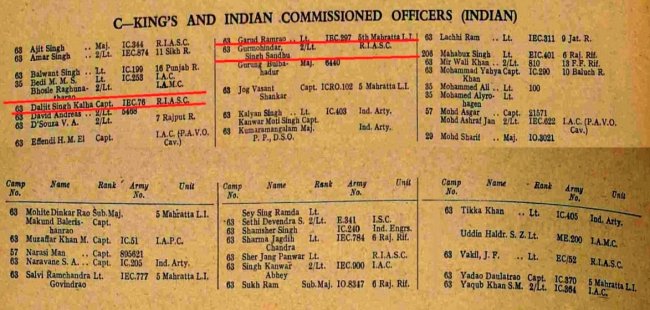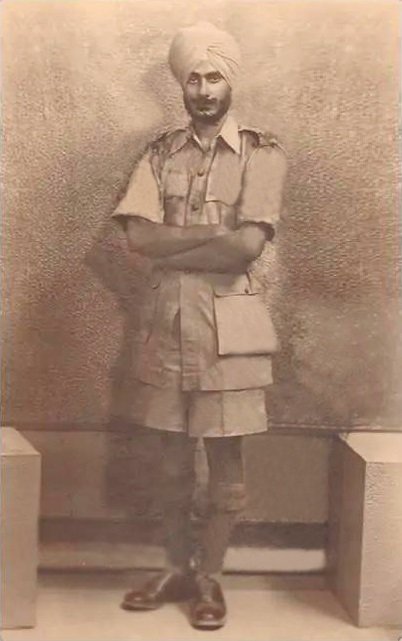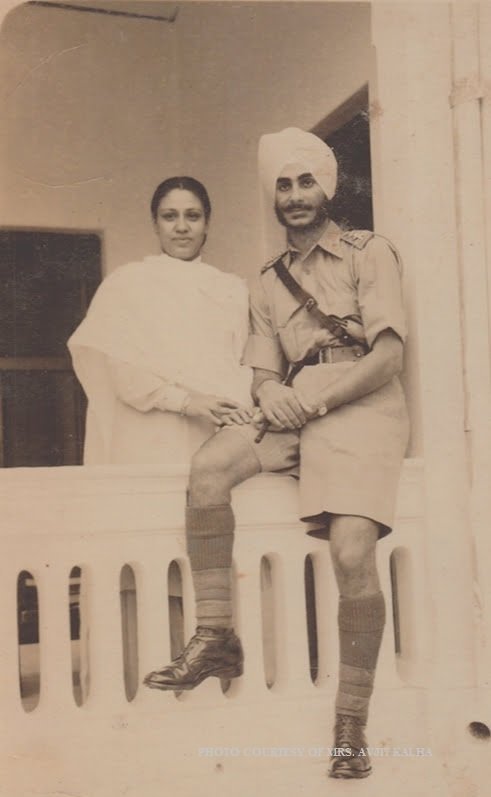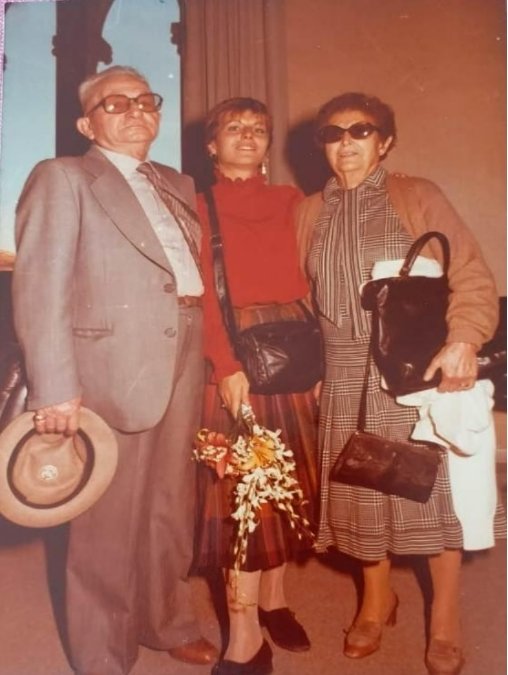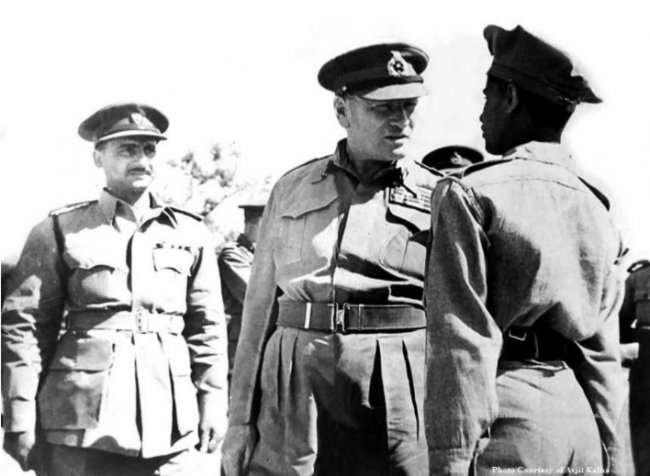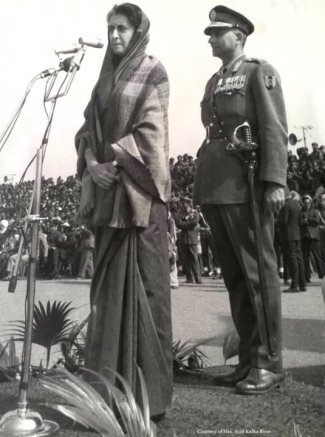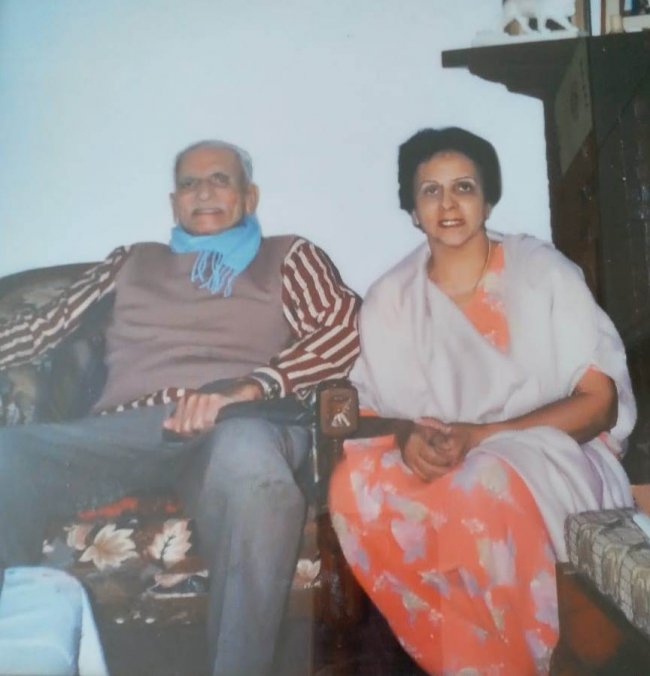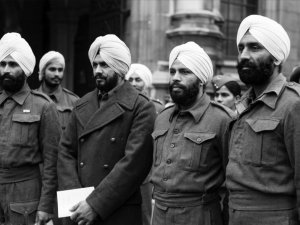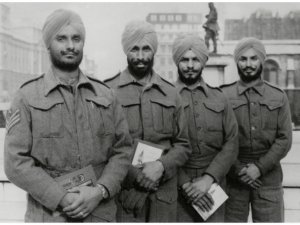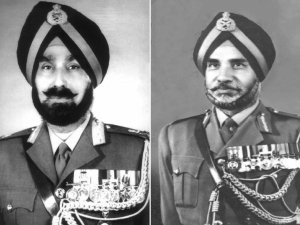This is a true life story during World War II of two Sikh prisoners of war imprisoned in Italy. 15 long months and 1 failed escape attempt, they finally managed to slip out of the Italian barbed-wire..... With the help of the Italian Doctor and Catholic Nuns.
They hid in caves in the mountains surrounding the village, and for nine months the liberated prisoners played a desperate game of hide and seek with German patrols, which were out continuously, searching for them, which they knew was hiding in the hills and in the village.
These accounts were recorded in the form of notes written on papers by Captain Daljit Singh Kalha and come from personal communications from his daughter Mrs. Avjit Kalha & from the Late Mr. Fabriani Domenico's family of Italy.
WHEN "TEWTS" IS ORDER OF THE DAY:
Officer-cadets at the Royal Indian Military Academy wearing their numbers and ready to go out on manoeuvres. "Tewts" is tactical-exercises-without-troops. 2/Lt. Daljit Singh Kalha standing second from right in the row. Dehra Dun .Circa 1939. Photo courtesy of Mrs. Avjit Kalha
He’s since passed away, but his daughter Avjit Kalha of Dehra Dun, India had long wondered about his time in the war. She set out on a journey to retrace her father’s steps that began in 1941, when Daljit Singh Kalha was commissioned into the Royal Indian Army Service Corps (R.I.A.S.C.) as 2/Lt.
His daughter, Avjit, visited Avezzano, Italy in 1984 and met with the families who sheltered her father until he was able to join the allied forces. She met Signora Lola Fabriani and her husband Signor Leone Giovanni. Lola was the daughter of Signor Fabriani Domenico and Signora Aida Velitti . Lola was a small girl then. She used to remember how her family provided food and shelter to Avjit's father and his friend for nine months. They shared the stories of Avjit's father and showed her the places where her father had once hidden.
Thousands of Indian soldiers were taken prisoners of war and moved to Italy. One such prisoner of war, was Captain Daljit Singh Kalha, who joined the Royal Indian Army Service Corps (R.I.A.S.C.) early in the war and served with the Allied forces in North Africa Campaign.
ON THE PARADE GROUND:
And typical of the fine type of young Indian now preparing for emergency commissions. 2/Lt. Daljit Singh Kalha. Royal Indian Military Academy, Dehra Dun .Circa 1940. Photo courtesy of Mrs. Avjit Kalha.
"The day when we left Mersa Matruh it was growing darker. The flashes of the guns could be seen, leaping in long orange tongues from the gun muzzles, caught in the early hours by Germans after we had tried thrice to get away. We were collected at a spot and kept for two days without anything to eat and very little water to drink. Everybody was looking sullen & silent".:~ Excerpts from Captain Daljit Singh Kalha's notes.
Captain Daljit Singh Kalha was taken as a prisoner during the siege of Tobruk on 28th of June 1942. They were crammed into open pens for two days without anything to eat and very little water to drink. The Germans handed them to the Italians for retention. From Benghazi, the Italians transported them by sea to Bari, their transit camp for prisoners of war and from there all Indian officers and JCO's were sent to the permanent camp P.G. 63 in Aversa, about 30 miles North of Naples.
It was very cold in Italy from November to February. January was the coldest month. The prisoners were wearing light summer clothing at the time of their capture. Many of the men lacked adequate winter clothes and blankets which during some of the winter months provided no warmth whatsoever. This, together with the lack of food at the start, made conditions extremely trying. Medical care was often delayed and when provided supplies were short.
POWs name List of King's & Indian Commissioned Officers. Captain Daljit Singh Kalha & 2nd Lt. Gurmohindar Singh Sandhu of R.I.A.S.C. underlined in red were interned at Camp No. P.G. 63, AVERSA. Many officers of this POW camp , names listed above, later played an important part in the history of India & Pakistan.
"Red Cross is a grand organization and the parcels we get from them makes us realize how really dependent we are on them. I shall never cease to be grateful to the Red Cross." :~ Excerpts from Captain Daljit Singh Kalha's notes.
Food parcels and letters from home were the two most important things in life to a prisoner of war.
Italian organization throughout the country was poor and food was scarce at times. Prisoners' food intake was rationed. Food portions became smaller and less nutritious. Due to the poor food rations both in terms of quality and quantity, a very large number of prisoners became sick and were doomed to die.
Prisoner nutrition improved to a certain degree in the second half of 1942, when the camp authorities permitted the receipt of food parcels. These parcels brought prisoners relief, hope, and nourishment.
The Red Cross parcels augmented the often-meager and deficient diets in the POW camps, contributing greatly to prisoner survival and sustaining the morale of prisoners of war. Thousands of prisoners of war would have died had it not been for the work of the Red Cross. The parcels and letters reminded the men that they had not been forgotten.
After the Allied force landed in Sicily on 10th July 1943, the Allied air raids were frequently launched on Naples and the industrial areas in Northern Italy. On the night of 19th July, 1943 there was heavy bombardment around their camp area. They were mentally and emotionally affected. All the prisoners were running helter-skelter in the camp. There were no air raid shelters to take cover in the camp during the attack. As the Allies advanced closer to the mainland of Italy, the air raids were very frequent around their camp area. On 8th August 1943, the Italians shifted them from Aversa to the Indian camp at Avezzano (P.G. 91) , 80 miles South of Rome.
Captain Daljit Singh Kalha Photo Courtesy of Mrs. Avjit Kalha.
"It was the duty of every prisoner of war to escape and if he did not escape at least he should have helped others to escape. ":~ Excerpts from Captain Daljit Singh Kalha's notes.
The hope of liberation was a key to POWs' morale. But a great many had no intention of passively awaiting the arrival of Allied forces, an attitude that was reinforced by the recognition that it was a POW's duty to attempt to escape.
From the start, all the escapers were aware that for any escape attempt to succeed it had to be well planned and organised to avoid being recaptured and brought back to the camp or, even worse, of being executed.
There was an Italian contractor and his worker who often came to the camp. They would do repairs and provide maintenance services in the camp. He always interacted with Captain Daljit Singh and they became good friends. Fabriani Domenico was a wood craftsman from Luco dei Marsi, a town which was about 10 Km away from the camp. One day Fabriani told him that the Italians are going the shift the prisoners to Germany and he convinced Captain Daljit Singh to learn Italian in order to escape.
Captain Daljit Singh learned the language and could speak grammatically correct Italian and later acquired certain fluency in it by working as an interpreter with Dr. Boccaletti, the Italian doctor, in their medical room in the camp.
In September 1943, Captain Daljit Singh's first attempt to escape failed. Under the pretense of talking to the guards by a group of his friends and diverting the guards attention, he and 2/Lt. Sandhu took advantage of the momentary inattention of his captors and tore holes in the barbed wire and commenced the grim venture for freedom. They needed to cover much ground to escape from the Germans, unfortunately while on the run, Sandhu became ill and could not run further and this had slowed down their pace.
Their freedom was short-lived, on the following day they were recaptured by the Germans who were hunting for them. They were brought back to the camp and interrogated. Both of them were tortured and were sentenced to solitary confinement. They were very lucky to be spared from execution by the Germans.
They never gave up . Their second attempt was also during the same month. This time he and Sandhu had to feign illness . With the help of the Italian doctor they were admitted to a hospital run by Catholic nuns. The nuns then facilitated their escape.
They wore turbans to cover their unshorn hair and beards. It would be almost impossible for them to blend in with the local population. Here, Captain Daljit Singh and 2/Lt. Sandhu were convinced to shave off their hair. Obtaining civilian clothing they masqueraded as Italian peasants and the rescuers were waiting outside the hospital with the bicycles to rescue them. German military checkpoints were established on all major roads leading to towns and villages. They managed to cycle pass through these German military checkpoints unnoticeable and disperse into the village of Luco dei Marsi.
Germans would patrol through the streets keeping a special eye out for these escaped prisoners & the railway police was keeping a close surveillance for these fugitives in the railway stations too. The Germans would send squads through the countryside looking for them. There were many informers everywhere. They would be rewarded lucratively if they shared information on these escapees to the Fascists and Nazi police.
Captain Daljit Singh Kalha and Mrs. Kalha. Photo courtesy of Mrs. Avjit Kalha.
Fabriani Domenico , Patrizia and wife, Aida Velitti.
Photo courtesy of Patrizia.
Fabriani Domenico and the farmers provided shelter for both of them in their barn in winter, huddled up with their cattle to keep them warm and in a nearby cave up in the mountains and sometimes hid them in the bushes during the summer.
Daljit Singh & Sandhu would play a game of hide and seek with the Germans. They were passed from one safe house to another to evade being captured by the German patrols while they were searching the houses for these escapees.
The families brought bread and water for them, who walked miles from their village daily to the caves in the mountains. Their very survival depended on the goodwill and courage of the families. With Germans roaming about the place it was very hard to bring food and supplies for the escapees to their hideout.
They shared their often-meagre food resources with the two soldiers. Despite the risks the family put themselves at great risk by providing whatever help they could, over a sustained period of time.
"This long period of captivity makes me say how it is almost impossible to imagine what home life is like. How I want to get under Eastern Skies again" :~ Excerpts from Captain Daljit Singh Kalha's notes.
They remained hidden in the countryside and survived for nine months helped by sympathetic Italian people until they were able to join with the Allied forces. The Italians escorted them and reunited both of them with the Allied forces which were passing nearby their village. They returned to India in July 1944.
Field Marshal Auchinleck visits the ASC Boys and presented Corps Colours Boys bn. Field Marshal with officer in command Major Daljit Singh Kalha at 10 MT Training Centre Bareilly . Circa 1945. Photo courtesy of Mrs. Avjit Kalha.
Dr. Boccaletti & Fabriani Domenico were working together behind the lines with the Italian resistance movement. Dr. Boccaletti was assisting the escape of the Indian Prisoners of war in the camp. Fabriani would arrange for their safe passage through the German lines and would make all the necessary arrangements for their shelter, food and take the escapees to the Allied lines.
Fabriani would smuggle civilian clothing into the camp. He and his worker would wear multiple layers of clothing and later during the lunch time they would secretly remove and pass the clothing to the prisoners.
These activities had to be carried out in secret, there was always the risk of being discovered.
The hospitable Italians and others behind the line were magnificent but they are not as well known as they deserve to be. In spite of German threats of execution for harbouring escaped prisoners of war, and offers of generous rewards for the capture of prisoners, Captain Daljit and 2/Lt. Sandhu lived safely among the Italians for about 9 months.
The Prime Minister of India, Mrs. Indira Gandhi with Col. Comdt. Daljit Singh Kalha. Circa 1969.Photo courtesy of Mrs. Avjit Kalha.
Lt. Col. Daljit Singh Kalha, commonly known as D.S. Kalha, served in Afghanistan as a military attache to the Embassy of India in 1954 and promoted to Lieutenant General and appointed DST Army HQ in October 1970, headed the corps as DST during Indo Pakistan War in 1971 & awarded PVSM for distinguished service of most exceptional order in the army and retired in 1973. His gratefulness and friendship with Fabriani Domenico and his family continued, and they corresponded in Italian for decades until Lieutenant General passed away on 31st December 2007.
Lt. General (Retd) Daljit Singh Kalha PVSM and Avjit Kalha .Circa 2006.
Photo courtesy of Mrs. Avjit Kalha.
Those who have information regarding 2/Lt. Gurmohindar Singh Sandhu (his wartime service number and his postwar service number (IEC 11961 and IC 1939) of R.I.A.S.C. and or his family members are most welcome to contact me via my e-mail :- [email protected]
Acknowledgements:
I am thankful to Mrs. Avjit Kalha & the family members of Late Signor Fabriani Domenico of Italy for their cooperation given to me during the interview session and assistance given by Mr. Ercole Wild.
Useful Resources:~
ASC Journal Year 2000
Gurmohindar Singh Sandhu:~ https://egazette.nic.in/WriteReadData/1947/E-2372-1947-0000-110380.pdf
